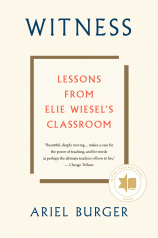Witness: Lessons from Elie Wiesel’s Classroom
Review
Witness: Lessons from Elie Wiesel’s Classroom
The inspirational teaching methods of Holocaust survivor Elie Wiesel form the backbone of this important work by his one-time assistant, Ariel Burger, a writer, artist, teacher and rabbi.
As a teenager, Burger became intrigued by this great man, who entered the Auschwitz concentration camps at roughly the same age as Burger was when the two first met. The contrast between his rather bland adolescent problems and the horrors that had beset the young Wiesel became a focus; eventually Burger studied with Wiesel and worked as his teaching assistant. In this book, which is semi-autobiographical, Burger recounts events that he observed in Professor Wiesel’s classroom at Boston University.
"Through his admiring lens, Burger conveys the absolute respect for humanity that characterized Wiesel’s philosophy and contributed to his many awards, including the Nobel Peace Prize."
Wiesel, who always considered himself first and foremost a teacher, began each class year by telling his students that they were the best he had ever taught. He set aside time in every class for students to present their intellectual input. He encouraged questions, at times even demanded them. Any question could become an inroad into the experiences of the questioner. When a student from Zimbabwe, whose brother was killed by Robert Mugabe during a protest, responded to Wiesel, he invited her to share her own story.
Wiesel was convinced that learning from wisdom sources and from one another is a key to survival. When the SS took him from his home, the 16-year-old --- a very devout student --- had been reading a certain page of scripture. Arriving at an orphanage after the liberation of Buchenwald, he demanded the same scripture, and went to the same page to resume his study. But even more crucial to overcoming hatred and promoting peace, Wiesel taught, is memory. When a student asked, “How can we have faith, especially in God, after what happened?” Wiesel responded, guru-like, “Only a wounded faith is worthy of a silent God.”
Interweaving situations in his own life with his long relationship with Wiesel, Burger shows that he himself is more than an academic. Following Wiesel’s example, he embraces individual stories and elicits them from others. Though some might find his personal recollections distracting, they provide the balance needed so that Wiesel and his protégé will be seen as human, a view that the professor doubtless would have supported. Burger was with his teacher up until a few days before his death, at the request of family, who felt that such visits made the old man happy.
Through his admiring lens, Burger conveys the absolute respect for humanity that characterized Wiesel’s philosophy and contributed to his many awards, including the Nobel Peace Prize. Wiesel said that he attended Adolf Eichmann’s trial, assuming he would be viewing a monster, but was only able to see him as a person: “We must always remember that a single life is worth more than all the words that have been written about life.”
Reviewed by Barbara Bamberger Scott on November 16, 2018
Witness: Lessons from Elie Wiesel’s Classroom
- Publication Date: October 22, 2019
- Genres: Memoir, Nonfiction
- Paperback: 304 pages
- Publisher: Mariner Books
- ISBN-10: 0358108527
- ISBN-13: 9780358108528




